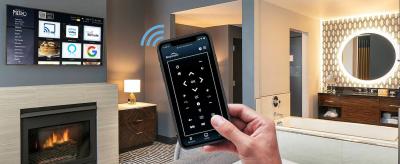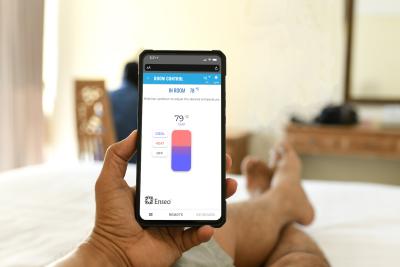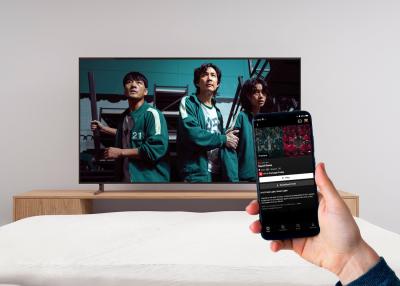Today’s hoteliers need to address the fact that guests now overwhelmingly expect in-room entertainment experiences to offer personalized content that is instantly accessible and importantly, doesn't require any sort of staff assistance. Before adopting any solution, properties must determine if a platform is able to provide a user-friendly experience that sidesteps potential system unfamiliarity issues that could lead to guest frustration.

hotel environments, properties can boost guest confidence
by preventing content from being inadvertently or
maliciously streamed to other rooms. (Hotel Internet Services)
“This includes providing an easy-to-navigate user interface and with regards to casting platforms, a simplified device-pairing process that doesn’t end with guests giving up and deciding to view their content on personal tablets or laptops,” said Gary Patrick, CEO of Hotel Internet Services. “With each guest having their own unique content-viewing preferences and streaming account subscriptions, hoteliers also need to consider a solution’s level of compatibility with any streaming service a guest may wish to access on guestroom televisions. This is especially true for international travelers who may wish to view streaming services based in their home region.”
The importance of a strong, reliable network became more relevant during the pandemic, said Kara Heermans, VP of user experience and product management at Sonifi. “When in the throes of the pandemic, there were fewer guests in the room but the amount of bandwidth being used was higher than ever before,” she said. “The usage of the internet has shifted from just checking email to streaming or video conferencing.”
“More guests are consuming entertainment for a longer period of time—which shows that in-room entertainment becomes even more important while entertainment opportunities outside the guest room are limited,” she continued. “Guests are now casting more than double the amount of time compared to prepandemic data.”
There also has been a big pull toward in-room fitness and on-demand yoga/meditation sessions, said David Goldstone, SVP and chief customer advocate at World Cinema. “We’ve all been focusing more on our health and well-being, and I think it’s only natural we’re seeing that transfer into the hotel space as well,” he said.
Another trend is personalization, said David Simpson, chief product officer at Enseo. “We are just at the tip of the iceberg in terms of personalization—way beyond just having the guest name on the TV screen.” He said guests will figure out their preferences and want those preferences saved for them every single time they stay at that hotel or even at the same brands.

whatever is the new normal—that includes whatever new
requirements there will be in the future. (Enseo)
DIRECTV’s Kimberly Twiggs, assistant VP of market development, said she saw a shift to digital transactions during the pandemic, and what was once considered a “nice-to- have” at a hotel has become a “must-have” as it relates to convenience and safety—and most importantly—customer satisfaction. “Contactless experiences have become the new norm and I see hoteliers continuing this trend going forward,” she said.
It’s not about lower touch; rather, it's that hotels are able to actually increase their engagement with their guests beyond the front desk by using technology, said Dominic Locascio, managing director of U.S. and Canada for Nonius. “Being able to connect before the guest even arrives and continuing that connection through the entertainment system, web app or mobile app has the ability to help the guest experience even more of what the hotel has to offer,” he said. “[That] can drive more revenue and greater guest satisfaction.”
How the pandemic has changed the future of in-room entertainment
The industry has been heading toward giving guests access to more entertainment options and creating a more personalized entertainment experience, with or without the pandemic. As guests’ at-home entertainment experiences have changed, their expectations of in-room entertainment continue to grow. The pandemic has only accelerated the timeline of this transformation, said Amir Ahmed, executive VP at Dish TV.
“Entertainment continues to be a critical part of the guest experience, but we don’t believe it’s limited to just the in-room experience,” he said. “Allowing for a personalized entertainment experience that provides easy access to both live and streaming content is increasingly an expectation in the room but will soon move beyond just in the room. We see the future of hospitality entertainment as a comprehensive experience, accessible on any device throughout the property. From televisions to tablets to mobile devices, guests want access to their favorite entertainment everywhere and we are providing exactly that.”
Streaming was already on the forefront of what entertainment companies were doing prepandemic. The forward-looking companies have been focused on really expanding the TV from a simple entertainment medium to a guest engagement and services platform that allows the property to communicate what makes the hotel and the city a unique destination, Locascio said. “Experiential and personalized travel can be true differentiators for hotel, while also improving the bottom line,” he continued. “It’s a win-win as you have happier guests who spend more and are more engaged with your brand.”

want to be able to access that same streaming content
when they travel. (Nonius)
Newer in-room entertainment technologies that are minimizing shared surface risks include the transforming of guest personal devices into virtual remotes that can control every television-based feature. This includes powering televisions on or off, changing channels or adjusting volume, casting content and accessing TV guides, Patrick said. For comprehensive in-room entertainment and guest service platforms, this also includes the ability to request hotel services or check out using personal devices.
“Advanced in-room entertainment solutions can also integrate with virtual assistants such as Amazon’s Alexa or Google Nest to provide guests with another option for contactless interaction,” he said. “Aside from providing voice-activated control over television-based functions and in-room service offerings, the integration can also provide contactless voice control capabilities over amenities such as lighting, thermostats and drapes.”
